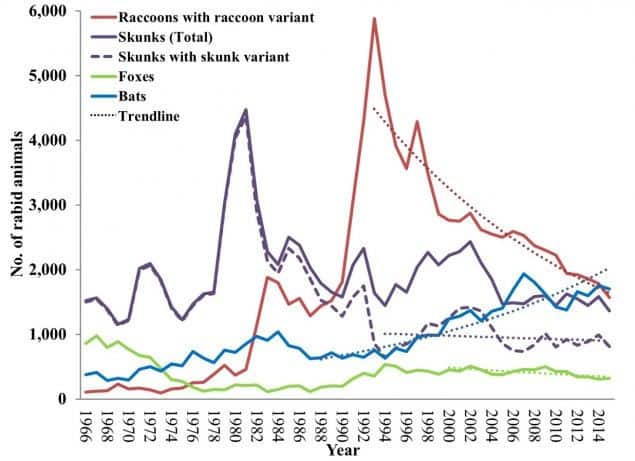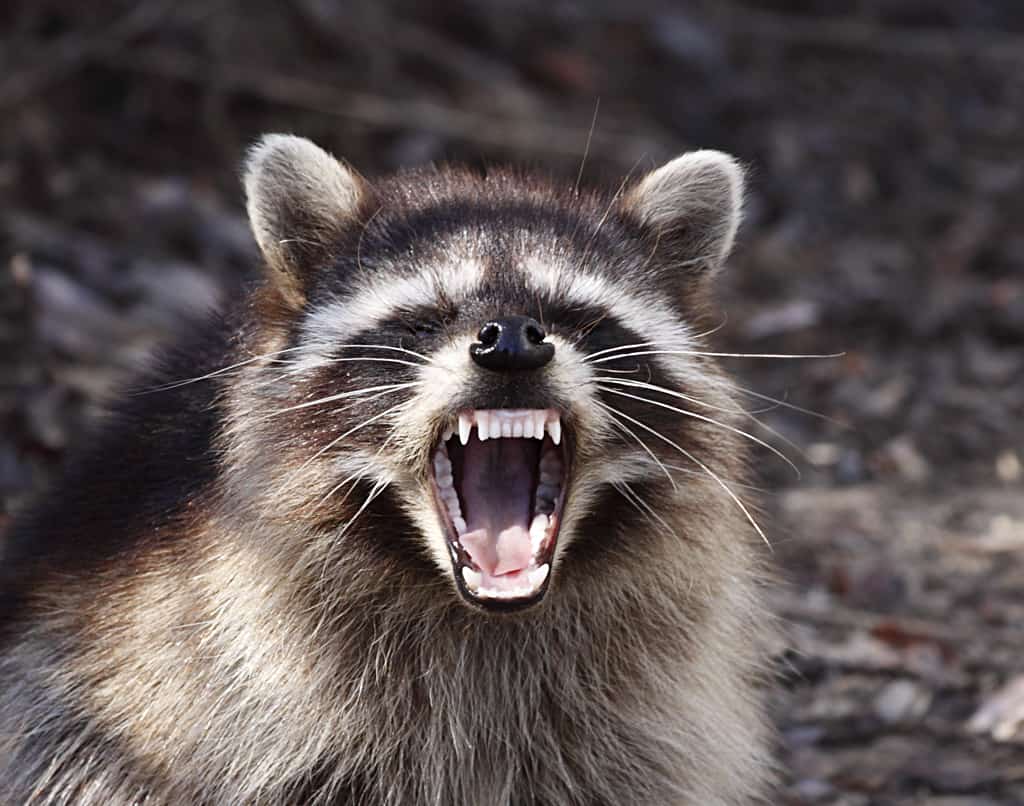A serious concern for pet owners is a possibility that a run-in with a rabid animal such as a skunk, raccoon, fox or possum could end up with your dog or cat contracting rabies. Rabies is 100% fatal.
The Statistics on Rabies
The Center for disease control keeps track of incidences of wild animals biting or
attacking domestic animals and they have found that there are about 3000 instances
every year on average of animals being bit by wildlife that might rabies positive. 
Rabies is transmitted through the saliva of an animal which has the virus. The virus which is transmitted through the saliva which can enter through the bite wound and then the virus works its way to the animal’s brain. Fortunately that means that being sprayed by a skunk with the virus does not pet can catch rabies. Also a dog or cat would not catch rabies by exposure to droppings or urine of an infected animal.
Identifying an Animal that May Have Rabies
Animal such as skunks, possum and raccoons are typically active at night. It animal infected with rabies can show signs of behavior which are not typical such as being active during the day, moving in a confused manner, not running away when approached by a person or pet. The presence of one of these animals during the day does not prove that the animal has rabies, because it may have been simply looking for food, or it may be defending its nest or it may have been provoked in some other way.
While a dog may be limited to interactions with infected animals that come into the yard, or if it is being walked or exercised in an open area such as forest preserve; cats which are allowed to roam freely may have a greater likelihood of coming across a wild animal getting into a potential fight which could lead to being bitten.
What happens if my dog or cat is bitten by a rabid animal
If your pet is bit by a wild animal you should contact your veterinarian immediately. The CDC recommends aggressively scrubbing the bite site and washing the bite with antiseptic soap and/or betadine, followed by flushing with plenty of water. If your animal has been vaccinated, your pet may simply require a booster shot and then a period of observation. If your pet was not vaccinated, it may require a period of quarantine to determine if your pet was actually infected with the virus.
Prevention
The best advice for minimizing the possibility of your pet contracting rabies is to keep rabies vaccinations current. Please check with your veterinarian to make sure your pet has the appropriate vaccinations and can be safely vaccinated. Some pets because of age or other health conditions may have difficulty receiving a rabies vaccination, so vigilance would be necessary to avoid contracting rabies from wild animal. Requirements for vaccinations can vary by state, a description of the requirements for each state compiled by the American Veterinary Medical Association (AVMA) can be viewed by clicking here.
Other steps that can be taken to avoid an interaction between your pet and an infected animal are to reduce possible sources of food or shelter for these animals around your property. Food that is left outside for your dog or cat can be a strong attraction for wildlife. Natural sources of food such as insects and small rodents may also draw animals like skunks to your property. Getting rid of grubs in your lawn will help reduce the attraction for skunks, as well as removal of unstacked piles of wood and wood bark which attract insects that skunks will eat, such as ground bees.
Raccoons and possum will also be attracted to a variety of food sources, however because they can climb you need to to be aware of food sources such as garbage cans with poorly fitting lids, food left out for pets, and food items that may be in a compost bin. If your yard has a fence around the area where your pet goes out, check for gaps in the fencing or areas that look like spots an animal has been burrowing or a dog has been digging. The areas of access need to be closed either by repairing the fencing or adding additional barrier material such as wire mesh that can be partially buried and secured to the fencing to eliminate and access point.
If you see an animal that you suspect may be sick it is best to contact animal control, your veterinarian or wildlife rehabilitation services. You don’t want to take a chance of you or your pet getting bit by a sick animal.

